Charles E W Bean, Diaries, AWM38 3DRL 606/246/1 - 1916 - 1929 - Part 6
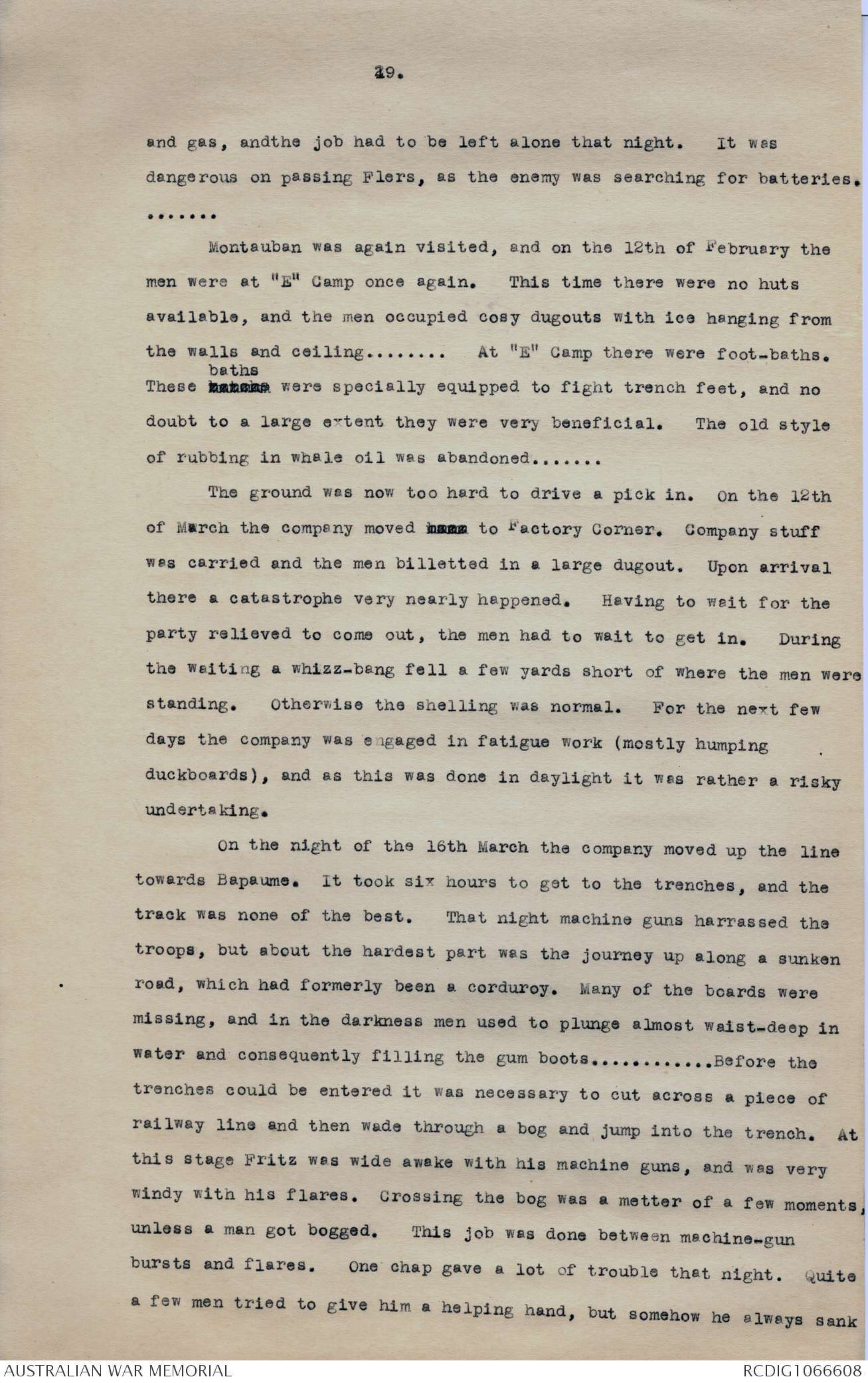
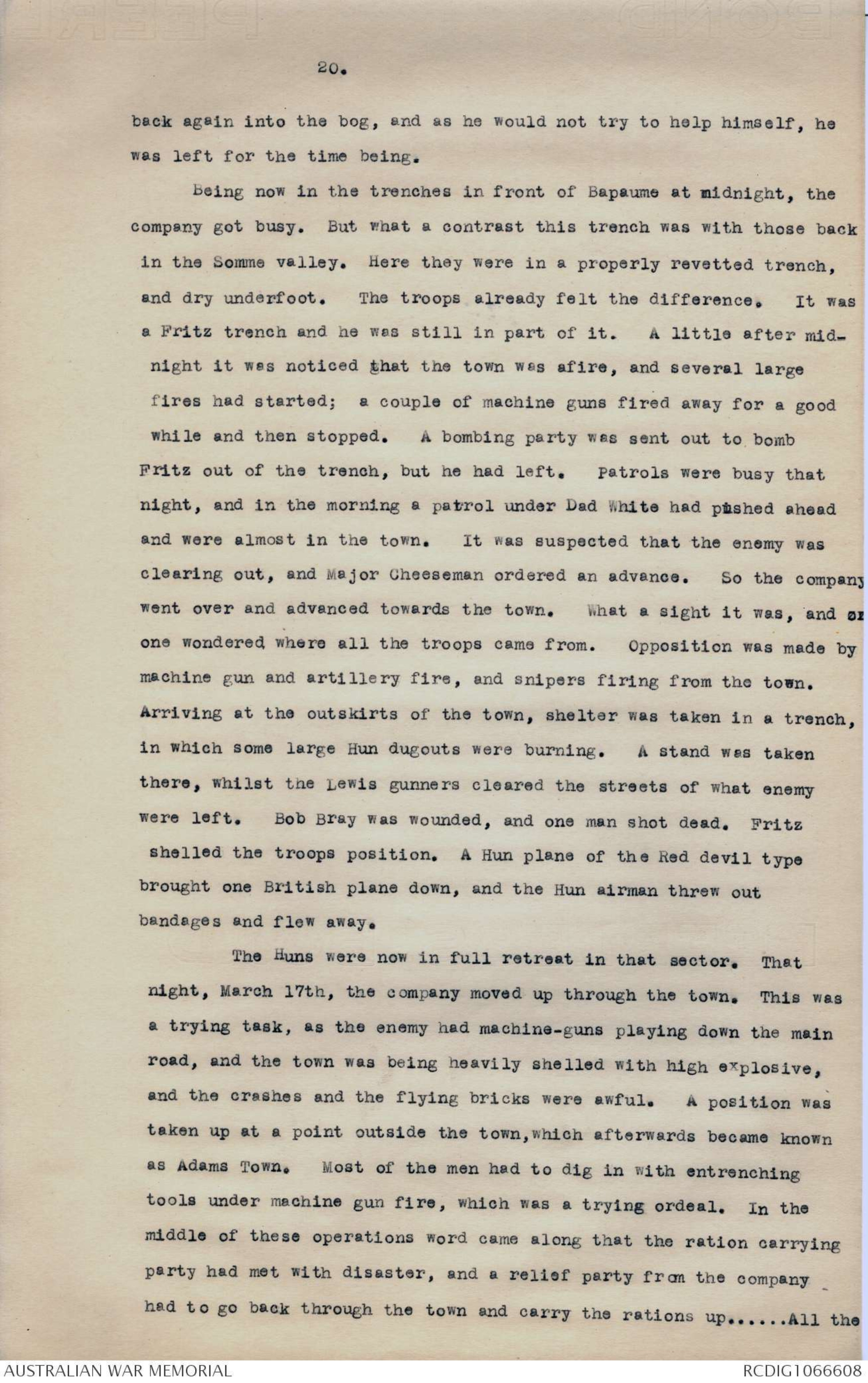
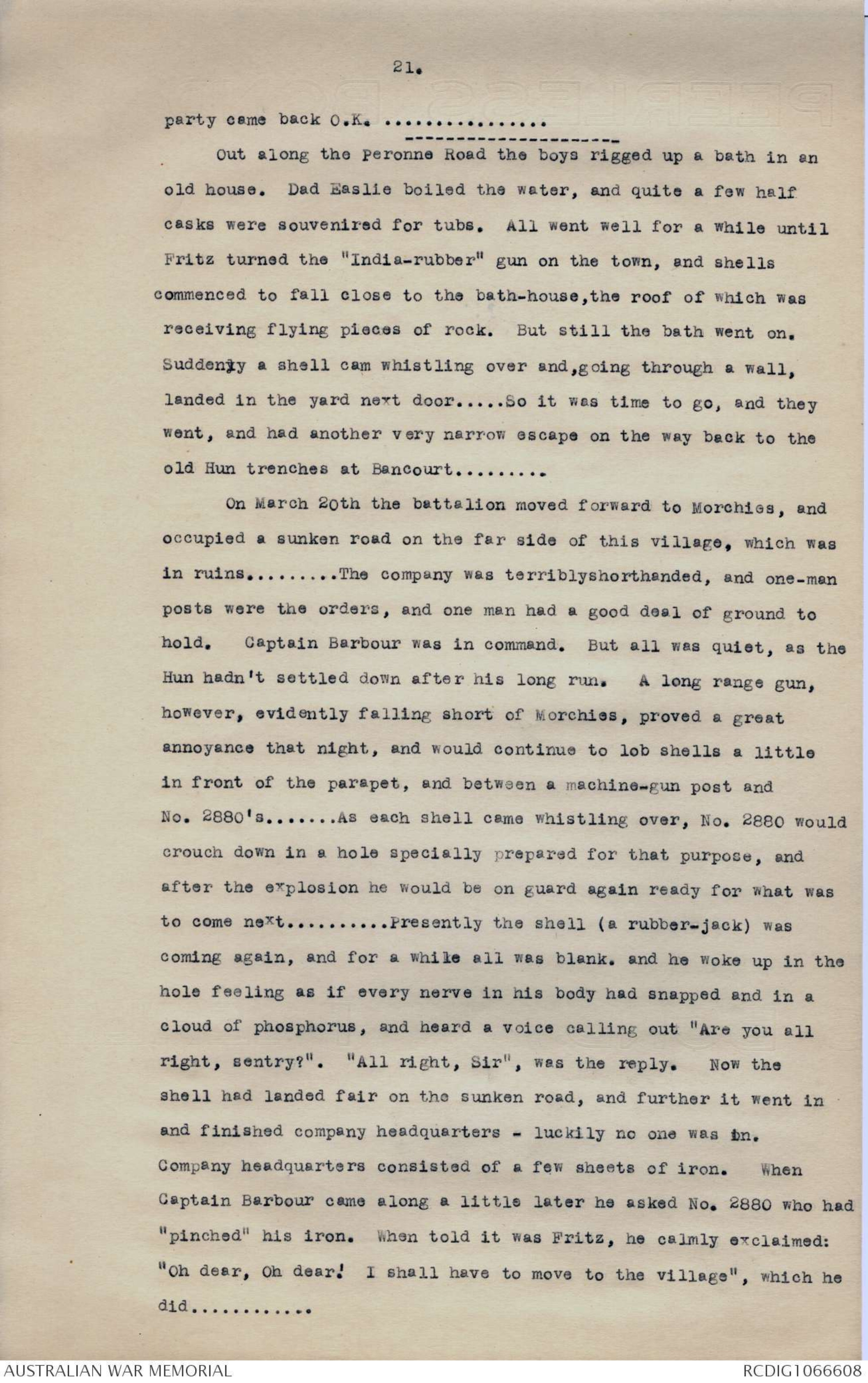
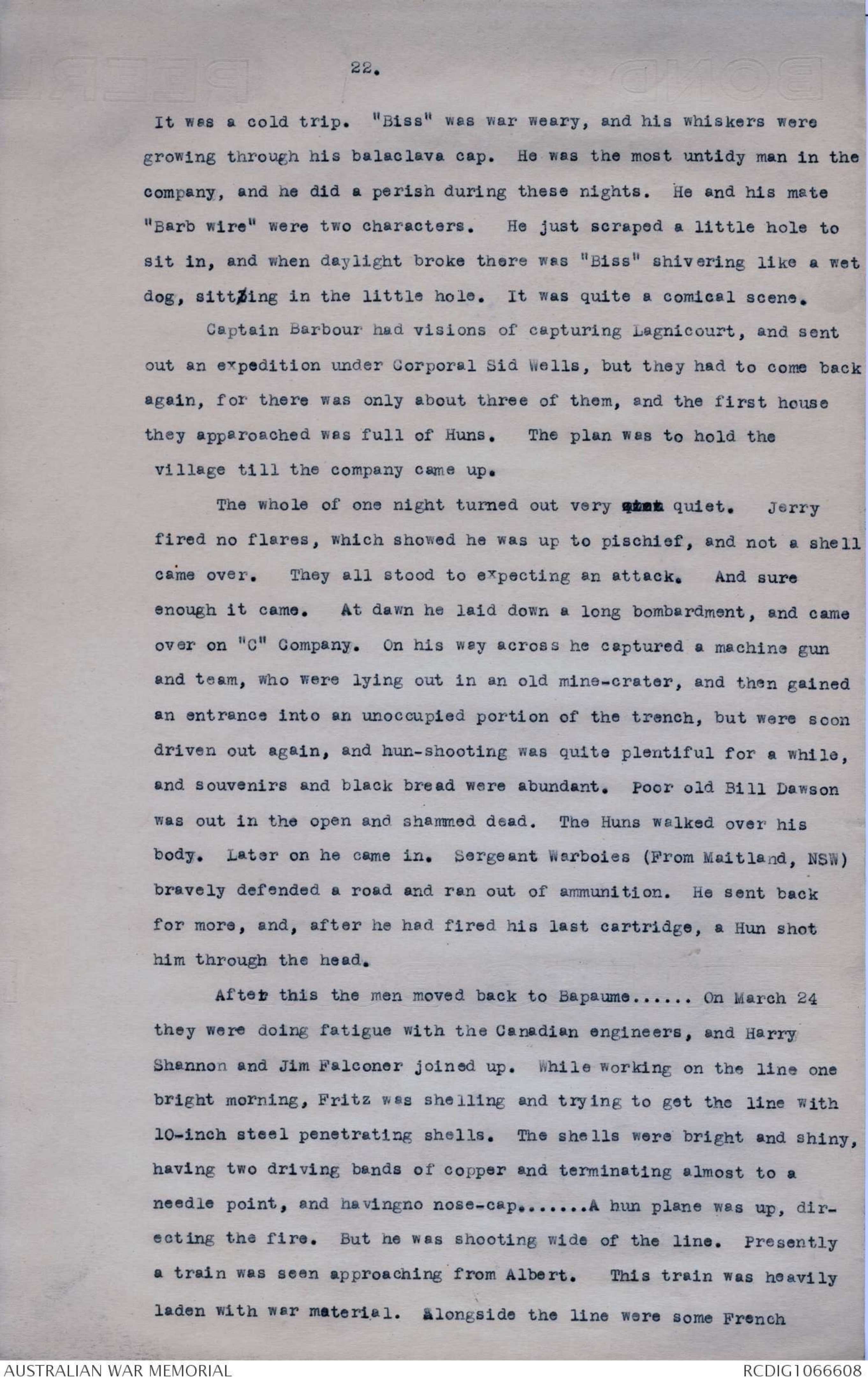
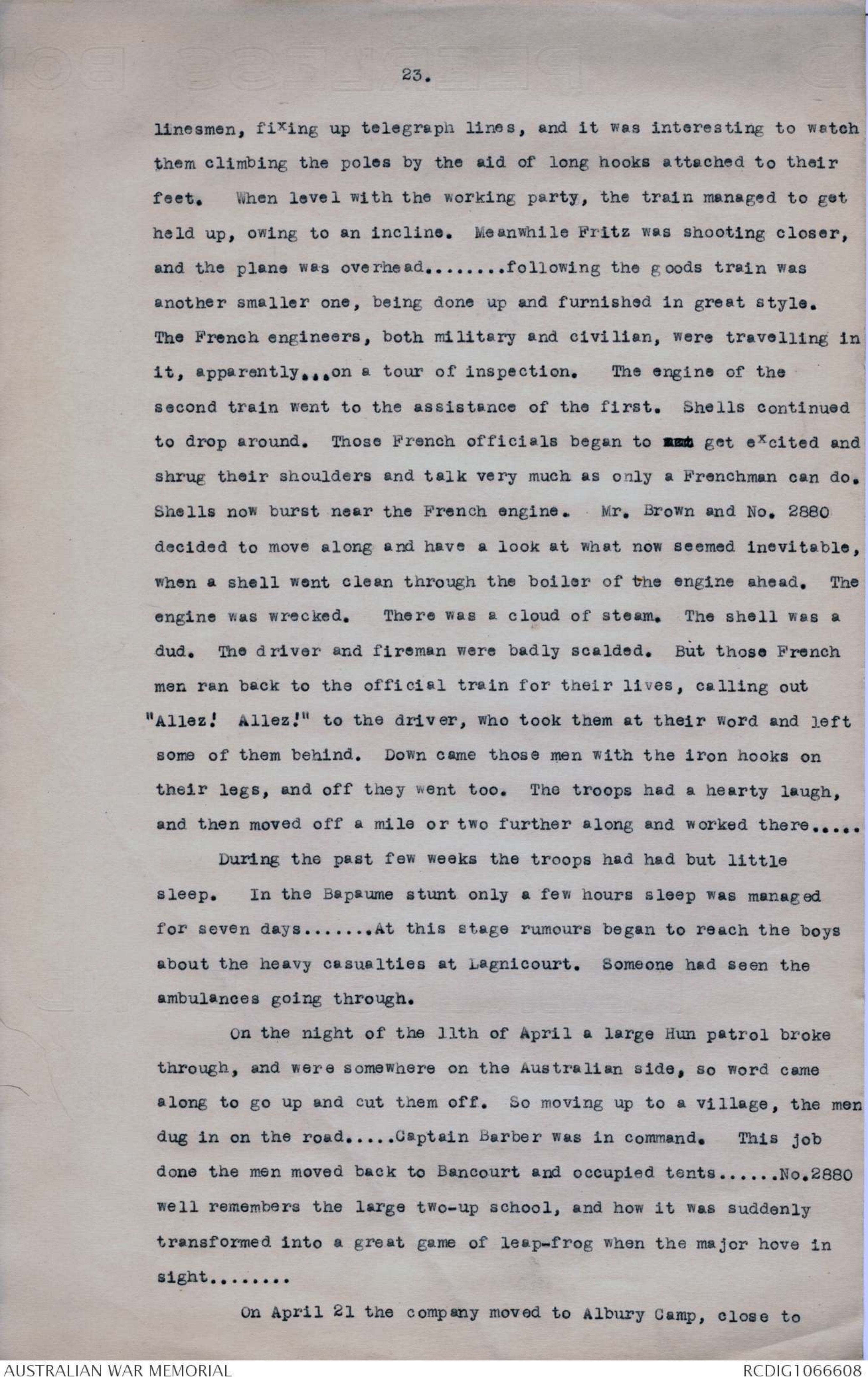
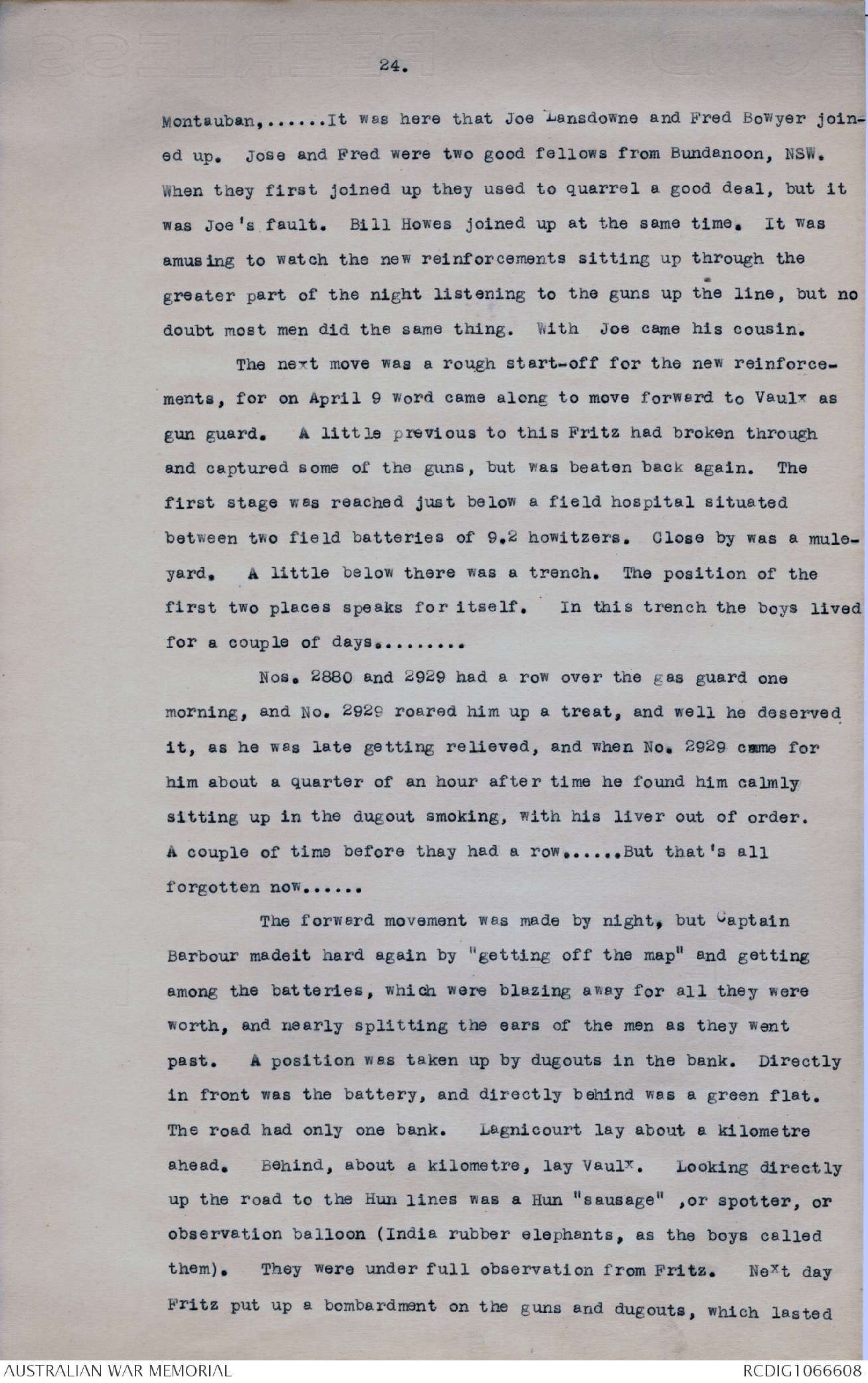
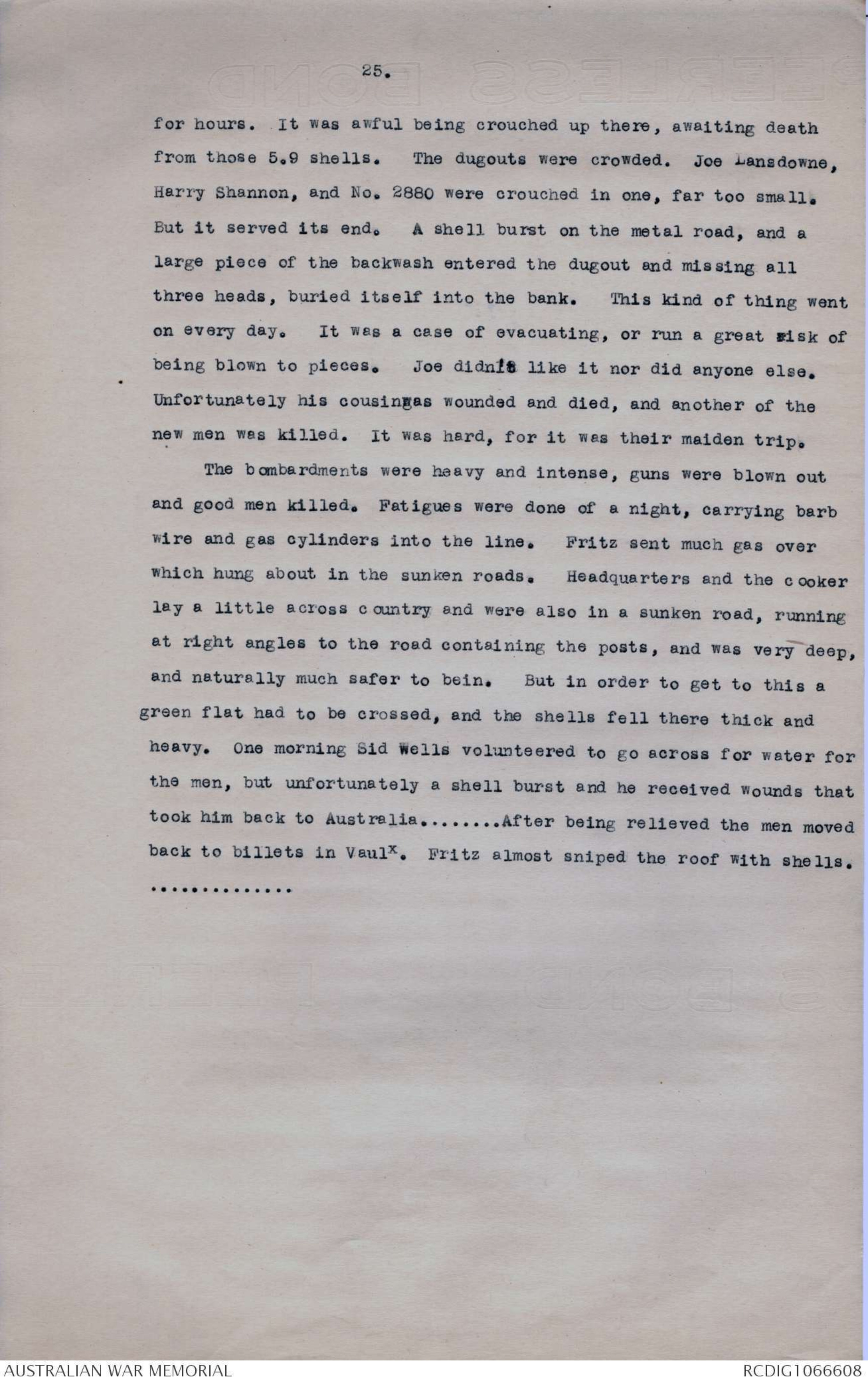
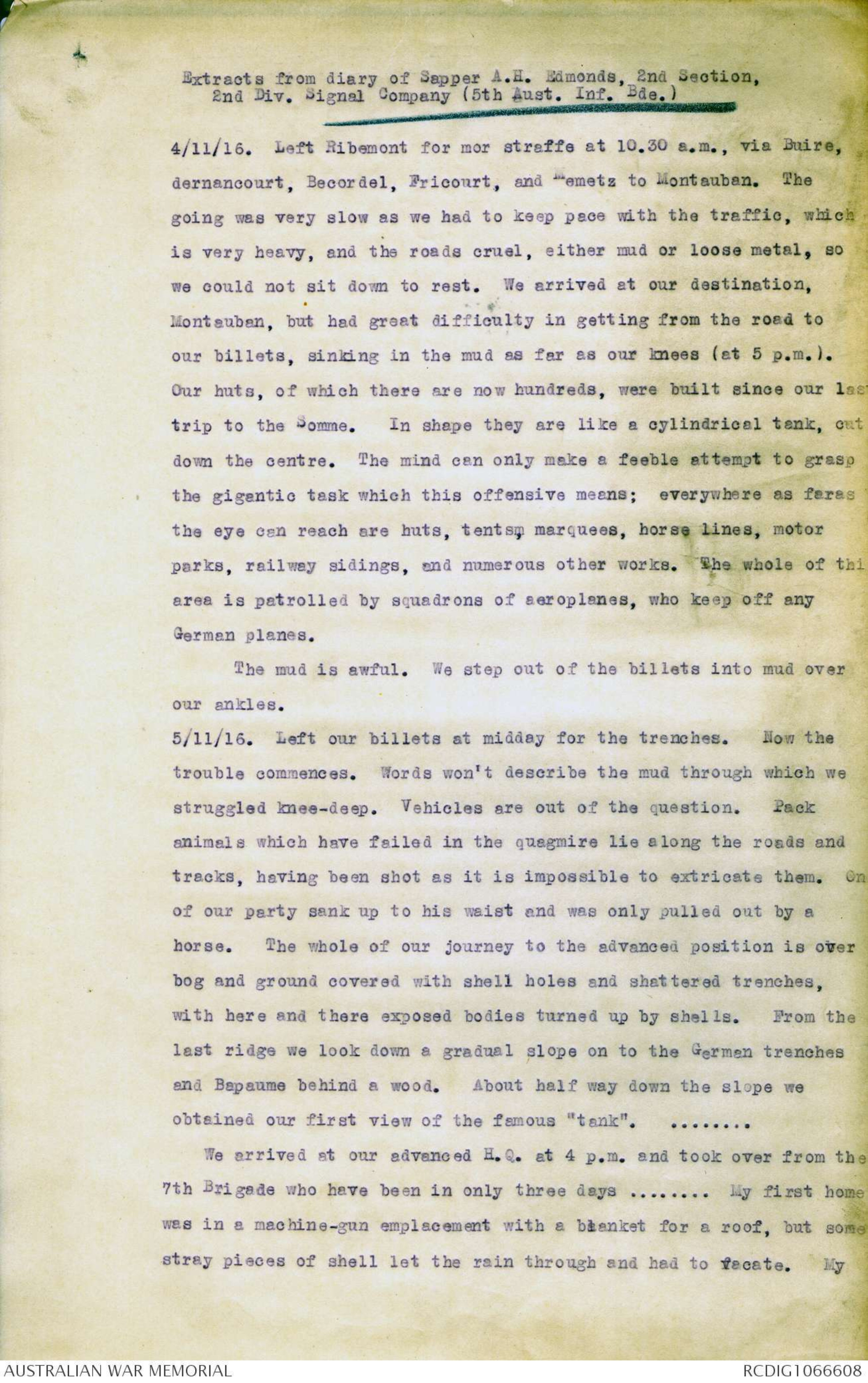
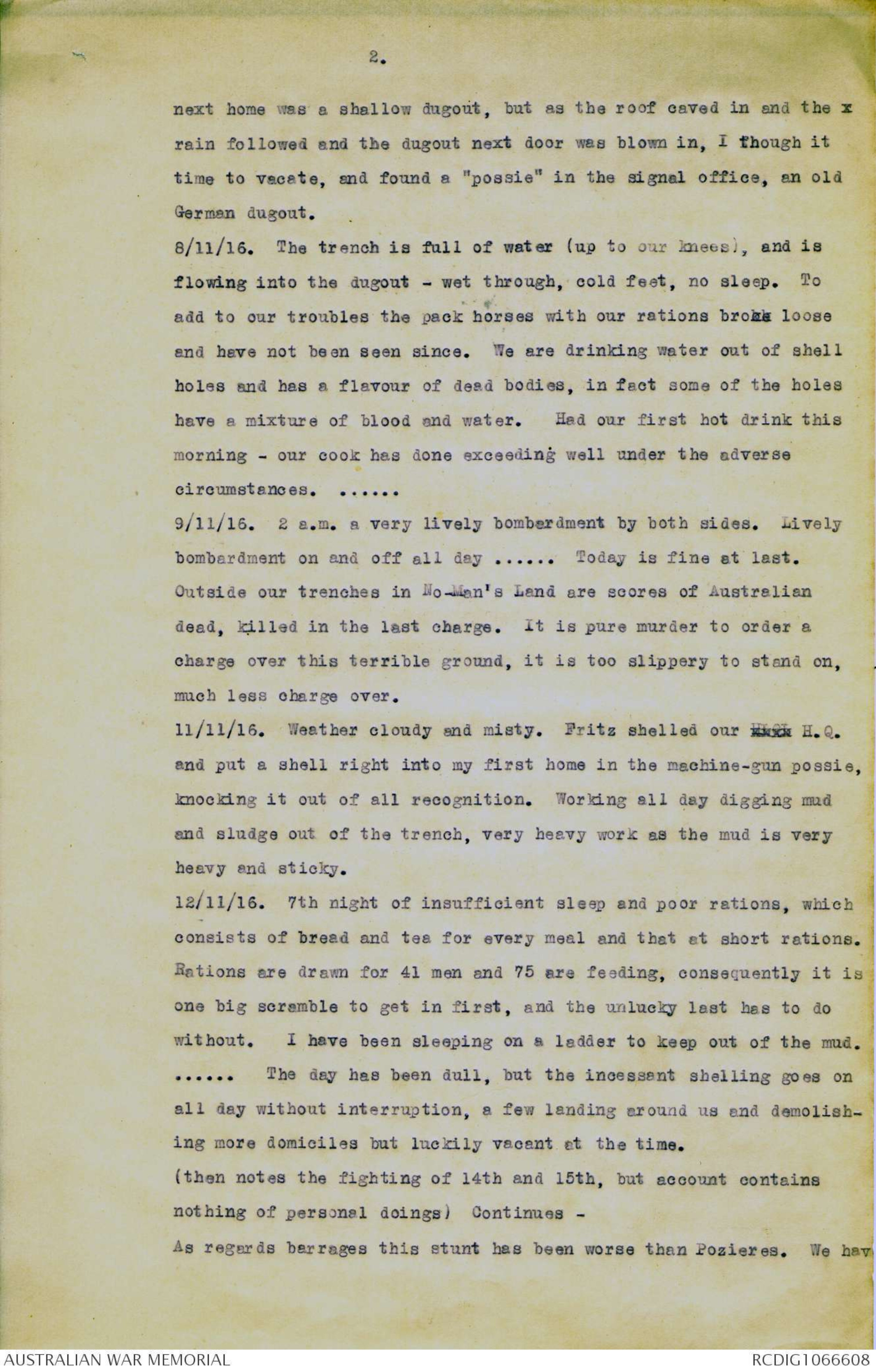
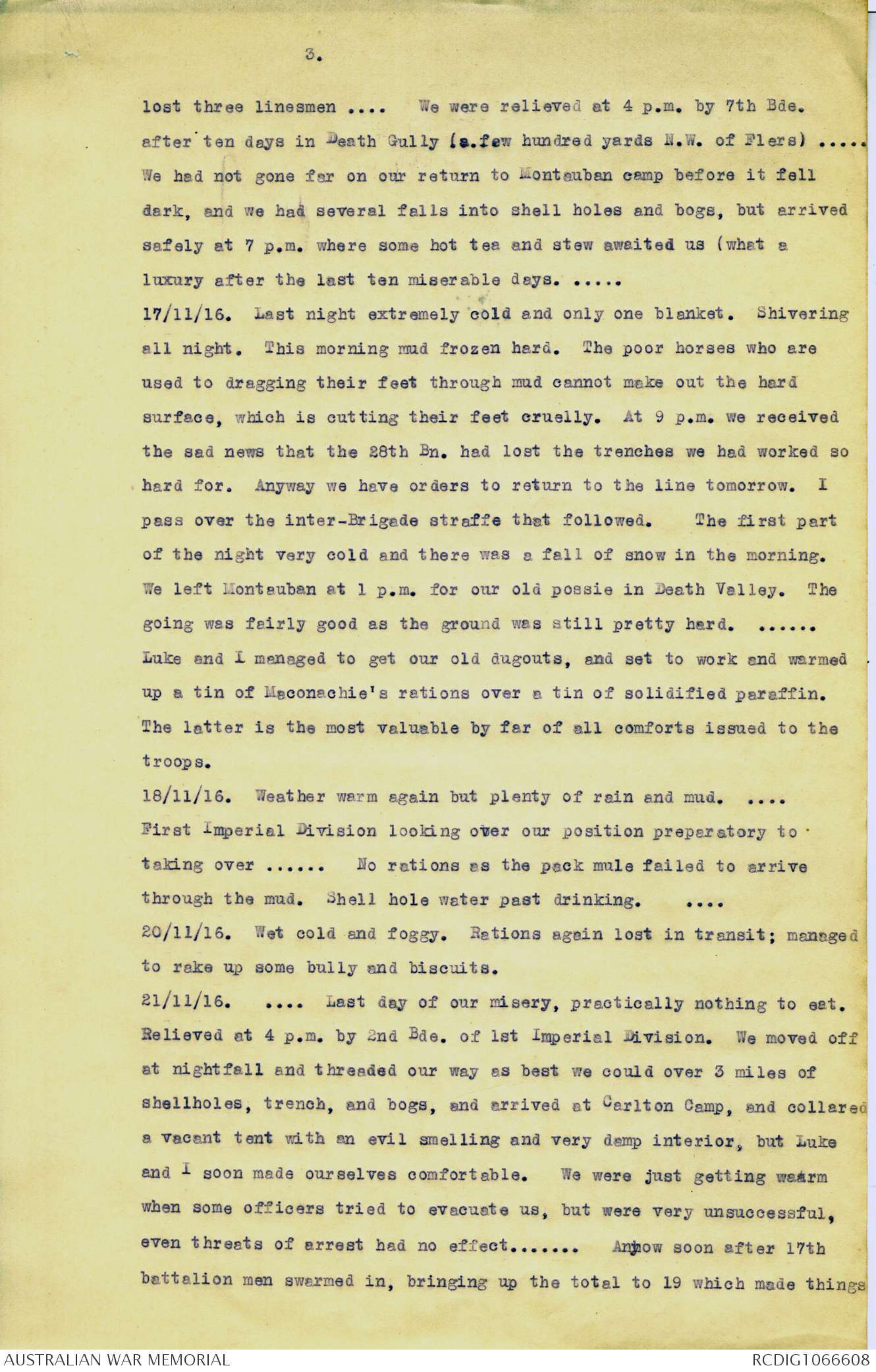
19.
and gas, andthe job had to be left alone that night. It was
dangerous on passing Flers, as the enemy was searching for batteries.
. . . . . .
Montauban was again visited, and on the 12th of February the
men were at "E" camp again. This time there were no huts
available, and the men occupied cosy dugouts with ice hanging from
the walls and ceiling . . . . . At "E" Camp there were foot-baths.
these xxxxx baths were specially equipped to fight trench feet, and no
doubt to a large extent they were very beneficial. The old style
of rubbing in whale oil was abandoned . . . . .
The ground was now too hard to dive a pick in. On the 12th
of March the company moved xxxx to Factory Corner. Company stuff
was carried and the men billetted in a large dugout. Upon arrival
there a catastrophe very nearly happened. Having to wait for the
party relieved to come out, the men had to wait to get in. During
the waiting a whizz-bang fell a few yards short of where the men were
standing. otherwise the shelling was normal. For the next few
days the company was engaged in fatigue work (mostly humping
duckboards), and as this was done in daylight it was rather a risky
undertaking.
On the night of the 16th March the company moved up the line
towards Bapaume. It took six hours to get to the trenches, and the
track was none the best. That night machine guns harrassed the
troops, but about the hardest part was the journey up along a sunken
road, which had formerly been a corduroy. Many of the boards were
missing, and in the darkness men used to plunge almost waist-deep in
water and consequently filling the gum boots . . . . . . Before the
trenches could be entered it was necessary to cut across a piece of
railway line and then wade through a bog and jump into the trench. At
this stage Fritz was wide awake with his machine guns, and was very
windy with his flares. Crossing the bog was a matter of a few moments,
unless a man got bogged. This job was done between machine-gun
bursts and flares. One chap gave a lot of trouble that night. Quite
a few men tried to give him a helping hand, but somehow he always sank
20.
back again into the bog, and as he would not try to help himself, he
was left for the time being.
Being now in the trenches in front of Bapaume at midnight, the
company got busy. But what a contrast this trench was with those back
in the Somme valley. here they were in a properly revetted trench,
and dry underfoot. The troops already felt the difference. It was
a fritz trench and he was still in part of it. A little after midnight
it was noticed that the town was afire, and several large
fires had started; a couple of machine guns fired away for a good
while and then stopped. A bombing party was sent out to bomb
Fritz out of the trench, but he had left. Patrols were busy that
night, and in the morning a patrol under Dad White had pushed ahead
and were almost in the town. It was suspected that the enemy was
clearing out, and Major Cheeseman ordered an advance. So the company
went over and advanced towards the town. What a sight it was, and ox
one wondered where all the troops came from. Opposition was made by
machine gun and artillery fire, and snipers firing from the town.
Arriving at the outskirts of the town, shelter was taken in a trench,
in which some large Hun dugouts were burning. A stand was taken
there, whilst the Lewis gunners cleared the streets of what enemy
were left. Bob Bray was wounded, and one man shot dead. Fritz
shelled the troops position. A Hun plane of the Red devil type
brought one British plane down, and the Hun airman threw out
bandages and flew away.
The Huns were now in full retreat in that sector. That
night, March 17th, the company moved up through the town. This was
a trying task, as the enemy had machine-guns playing down the main
road, and the town was being heavily shelled with high explosive,
and the crashes and the flying bricks were awful. A position was
taken up at a point outside the town,which afterwards became known
as Adams Town. Most of the men had to dig in with entrenching
tools under machine gun fire, which was a trying ordeal. In the
middle of these operations word came along that the ration carrying
party had met with disaster, and a relief party from the company
had to go back through the town and carry the rations up. . . . .All the
21.
party came back O.K. . . . . . . . .
Out along the Peronne Road the boys rigged up a bath in an
old house. Dad Easlie boiled the water, and quite a few half
casks were souvenired for tubs. All went well for a while until
Fritz turned the "India-rubber" gun on the town, and shells
commenced to fall close to the bath-house,the roof of which was
receiving flying pieces of rock. But still the bath went on.
Suddenly a shell cam whistling over and.going through a wall,
landed in the yard next door. . . . So it was time to go, and they
went, and had another very narrow escape on the way back to the
old Hun trenches at Bancourt. . . . . .
On March 20th the battalion moved forward to Morchies, and
occupied a sunken road on the far side of this village, which was
in ruins. . . . . . .The company was terriblyshorthanded, and one-man
posts were the orders, and one man had a good deal of ground to
hold. Captain Barbour was in command. But all was quiet, as the
Hun hadn't settled down after his long run. A long range gun,
however, evidently falling short of Morchies, proved a great
annoyance that night, and would continue to lob shells a little
in front of the parapet, and between a machine-gun post and
No. 2880's. . . . . As each shell came whistling over, No. 2880 would
crouch down in a hole specially prepared for that purpose, and after the explosion he would be on guard again ready for what was
to come next. . . . . .Presently the shell (a rubber-jack) was
coming again, and for a while all was blank. and he woke up in the
hole feeling as if every nerve in his body had snapped and in a
cloud of phosphorus, and heard a voice calling out "Are you all
right, sentry?". "All right, Sir", was the reply. Now the
shell had landed fair on the sunken road, and further on it went in
and finally finished company headquarters - luckily no one was in.
Company headquarters consisted of a few sheets of iron. When
Captain Harbour came along a little later he asked No. 2880 who had
"pinched" his iron. When told it was Fritz, he calmly exclaimed:
"Oh dear, Oh dear! I shall have to move to the village", which he
did . . . . . . . .
22.
It was a cold trip. "Biss" was war weary, and his whiskers were
growing through his balaclava cap. He was the most untidy man in the
company, and he did a perish during these nights. he and his mate
"Barb wire" were two characters. He just scraped a little hole to
sit in, and then when daylight broke there was "Biss" shivering like a wet
dog, sittxing in the little hole. It was quite a comical scene.
Captain Barbour had visions of capturing Lagnicourt, and sent
out an expedition under Corporal Sid Wells, but they had to come back
again, for there was only about three of them, and the first house
they approached was full of Huns. The plan was to hold the
village till the company came up.
The whole of the night turned out very xxxx quiet. Jerry
fired no flares, which showed he was up to pischief, and not a shell
came over. They all stood to expecting an attack. And sure
enough it came. At dawn he laid down a long bombardment, and came
over on "C" Company. On his way across he captured a machine gun
and team, who were lying out in an old mine-crater, and then gained
an entrance into an unoccupied portion of the trench, but were soon
driven out again, and hun-shooting was quite plentiful for a while,
and souvenirs and black bread were abundant. Poor old Bill Dawson
was out in the open and shammed dead. The Huns walked over his
body. Later on he came in. Sergeant Warboies (From Maitland, NSW)
bravely defended a road and ran out of ammunition. He sent back
for more, and, after he had fired his last cartridge, a Hun shot
him through the head.
After this the men moved back to Bapaume . . . . . On March 24
they were doing fatigue with the Canadian engineers, and Harry
Shannon and Jim Falconer joined up. While working on the line one
bright morning, Fritz was shelling and trying to get the line with
10-inch steel penetrating shells. The shells were bright and shiny,
having two driving bands of copper and terminating almost to a
needle point, and havingno nose-cap. . . . .A hun plane was up, directing
the fire. But he was shooting wide of the line. presently
a train was seen approaching from Albert. This train was heavily
laden with war material. Alongside the line were some French
23.
linesmen, fixing up telegraph lines, and it was interesting to watch
them climbing up the poles by the aid of long hooks attached to their
feet. When level with the working party, the train managed to get
held up, owing to an incline. Meanwhile fritz was shooting closer,
and the plane was overhead. . . . .following the goods train was
another smaller one, being done up and furnished in great style.
The French engineers, both military and civilian, were travelling in
it, apparently . . . on a tour of inspection. The engine of the
second train went to the assistance of the first. Shells continued
to drop around. Those French officials began to xxx get excited and
shrug their shoulders and talk very much as only a Frenchman can do.
Shells now burst near the French engine. Mr. Brown and No. 2880
decided to move along and have a look at what now seemed inevitable,
when a shell went clean through the boiler of the engine ahead. The
engine was wrecked. There was a cloud of steam. The shell was a
dud. The driver and fireman were badly scalded. But those french
men ran back to the official train for their lives, calling out
"Allez! Allez!" to the driver, who took them at their word and left
some of them behind. Down came those men with the iron hooks on
their legs, and off they went too. The troops had a hearty laugh,
and then moved off a mile or two further along and worked there. . . . .
During the past few weeks the troops had had but little
sleep. In the Bapaume stunt only a few hours sleep was managed
for seven days . . . . . .At this stage rumours began to reach the boys
about the high casualties at Lagnicourt. Someone had seen the
ambulances going through.
On the night of the 11th of April a large Hun patrol broke
through, and were somewhere on the Australian side, so word came
along to go up and cut them off. So moving up to a village, the men
dug in on the road. . . . . Captain Barbour was in command. This job
done the men moved back to Bancourt and occupied tents . . . . .No.2880
well remembers the large two-up school, and how it was suddenly
transformed into a great game of leap-frog when the major hove in
sight . . . . .
On April 21 the company moved to Albury Camp, close to
24.
Montauban, . . . . . It was here that Joe Lansdowne and Fred Bowyer joined
up. Jose and Fred were two good fellows from Bundanoon, NSW.
When they first joined up they used to quarrel a good deal, but it
was Joe's fault. Bill Howes joined up at the same time. It was
amusing to watch the new reinforcements sitting up through the
greater part of the night listening to the guns up the line, but no
doubt most men did the same thing. With Joe came his cousin.
The next move was a rough start-off for the new reinforcements,
for on April9 word came along to move forward to Vaulx as
gun guard. A little previous to this fritz had broken through
and captured some of the guns, but was beaten back again. The
first stage was reached just below a field hospital situated
between two field batteries of 9.2 howitzers. Close by was a mule-
yard. A little below there was a trench. In this trench the boys lived
for a couple of days. . . . . .
Nos. 2880 and 2929 had a row over the gas guard. and well he deserved
it, as he was late getting relieved, and when No. 2929 came for
him about a quarter of an hour after time he found him calmly
sitting up in the dugout smoking, with his liver out of order.
A couple of time before they had a row. . . . .But that's all
forgotten now. . . . .
The forward movement was made by night, but Captain
Barbour madeit hard again by "getting off the map" and getting
among the batteries, which were blazing away for all they were
worth, and nearly splitting the ears of the men as they went
past. A position was taken up by dugouts in the bank. Directly
in front was the battery, and directly behind was a green flat.
The road had only one bank. Lagnicourt lay about a kilometre
ahead. Behind, about a kilometre, lay Vaulx. Looking directly
up the road to the Hun lines was a Hun "sausage" , or spotter, or
observation balloon (India rubber elephants, as the boys called
them). They were under full observation from Fritz. Next day
Fritz put up a bombardment on the guns and dugouts, which lasted
25.
for hours. It was awful being crouched up there, awaiting death
from those 5.8 shells. The dugouts were crowded. Joe Lansdowne,
Harry Shannon and No 2880 were crouched in one, far too small.
But it served its end. A shell burst on the metal road, and a
large piece of the backwash entered the dugout and missing all
three heads, buried itself into the bank. This kind of thing went
on every day. It was a case of evacuating, or run a great risk of
being blown to pieces. Joe didn't like it nor did anyone else.
Unfortunately his cousingwas wounded and died, and another of the
new men was killed. It was hard, for it was their maiden trip.
The bombardments were heavy and intense, guns were blown out
and good men killed. Fatigues were done of a night, carrying barb
wire and gas cylinders into the line. Fritz sent much gas over
which hung about in the sunken roads. Headquarters and the c ooker
lay a little across country and were also in a sunken road, running
at right angles to the road containing the posts, and was very deep,
and naturally much safer to be in. But in order to get to this a
green flat had to be crossed, and the shells fell there thick and
heavy. One morning Sid Wells volunteered to go across for water for
the men, but unfortunately a shell burst and he received wounds that
took him back to Australia. . . . . . After being relieved the men moved
back to billets in Vaulx. Fritz almost sniped the roof with shells.
. . . . . .
Extracts from diary of Sapper A.H. Edmonds, 2nd Section,
2nd Div. Signal Company (5th Aust. Inf. Bde.)
4/11/16. Left Ribemont for mor straffe at 10.30 a.m., via Buire,
dernancourt, Becordel, Fricourt, and Memetz to Montauban. The
going was very slow as we had to keep pace with the traffic, which
is very heavy, and the roads cruel, either mud or loose metal, so
we could not sit down to rest. We arrived at our destination,
Montauban, but had great difficulty in getting from the road to
our billets, sinking in the mud as far as our knees (at 5 p.m.).
Our huts, of which there are now hundreds, were built since our last
trip to the Somme. In shape they are like a cylindrical tank, cut
down the centre. The mind can only make a feeble attempt to grasp
the gigantic task which this offensive means; everywhere as faras
the eye can reach are huts, tents, marquees, horse lines, motor
parks, railway sidings, and numerous other works. The whole of this
area is patrolled by squadrons of aeroplanes, who keep off any
German planes.
The mud is awful. We step out of the billets into mud over
our ankles.
5/11/16. Left our billets at midday for the trenches. Now the
trouble commences. Words won't describe the mud through which we
struggled knee-deep. Vehicles are out of the question. Pack
animals which have failed in the quagmire lie along the roads and
tracks, having been shot as it is impossible to extricate them. One
of our party sank up to his waist and was only pulled our by a
horse. The whole of our journey to the advanced position is over
bog and ground covered with shell holes and shattered trenches,
with here and there exposed bodies turned up by shells. From the
last ridge we look down a gradual slope on the German trenches
and Bapaume behind a wood. About half way down the slope we
obtained our first view of the famous "tank" . . . . . . . .
We arrived at our advanced H.Q. at 4 p.m. and took over from the
7th Brigade who have been in only three days . . . . . My first home
was in a machine-gun emplacement with a blanket for a roof, but some
stray pieces of shell let the rain through and had to vacate. My
2.
next home was a shallow dugout, but as the roof caved in and the x
rain followed and the dugout next door was blown in, I though it
time to vacate, and found a "possie" in the signal office, an old
German dugout.
8/11/16. The trench is full of water (up to our knees), and is
flowing into the dugout - wet through, cold feet, no sleep. To
add to our troubles the pack horses with our rations broke loose
and have not been seen since. We are drinking water out of shell
holes and has a flavour of dead bodies, in fact some of the holes
have a mixture of blood and water. Had our first hot drink this
morning - our cook has done exceeding well under the adverse
circumstances. . . . . .
9/11/16. 2 a.m. a very lively bombardment by both sides. Lively
bombardment on and off all day . . . . . Today is fine at least.
Outside our trenches in No-Man's Land are scores of Australian
dead, killed in the last charge. It is pure murder to order a
charge over this terrible ground, it is too slippery to stand on,
much less charge over.
11/11/16. Weather cloudy and misty. Fritz shelled our xxxx H.Q.
and put a shell right into my first home in the machine-gun possie,
knocking it out of all recognition. Working all day digging mud
and sludge out of the trench, very heavy work as the mud is very
heavy and sticky.
12/11/16. 7th night of insufficient sleep and poor rations, which
consists of bread and tea for every meal and that at short rations.
Rations are drawn for 41 men and 75 are feeding, consequently it is
one big scramble to get in first, and the unlucky last has to do
without. I have been sleeping on a ladder to keep out the mud.
. . . . . The day has been dull, but the incessant shelling goes on
all day without interruption, a few landing around us and demolishing
more domiciles but luckily vacant at the time.
(then notes the fighting of 14th and 15th, but account contains
nothing of personal doings) Continues -
As regards barrages this stunt has been worse than Pozieres. We hav
3.
lost three linesmen . . . . We were relieved at 4 p.m. by 7th Bde.
after ten days in Death Gully (a.few hundred yards N.W. of Flers) . . . . .
We had not gone far on our return to Montauban camp before it fell
dark, and we had several falls into shell holes and bogs, but arrived
safely at 7 p.m. where some hot tea and stew awaited us (what a
luxury after the last ten miserable days. . . . . .
17/11/16. Last night extremely cold and only one blanket. Shivering
all night, This morning mud frozen hard. The poor horses who are
use to dragging their feet through mud cannot make out the hard
surface, which is cutting their feet cruelly. At 9 p.m. we received
the sad news that 28th Bn. had lost the trenches we had worked so
hard for. Anyway we have orders to return to the line tomorrow. I pass
over the inter-Brigade straffe that followed. The first part
of the night very cold and there was a fall of snow in the morning.
We left Montauban at 1 p.m. for our old possie in Death Valley. The
going was fairly good as the ground was still pretty hard. . . . . .
Luke and I managed to get our old dugouts, and set to work and warmed
up a tin of Maconachie's rations over a tin of solidified paraffin.
The latter is the most valuable by far of all the comforts issued to the
troops.
18/11/16. Weather warm again but plenty of rain and mud. , , , ,
First Imperial Division looking over our position preparatory to
taking over . . . . . No rations as the pack mule failed to arrive
through the mud. Shell hole water drinking. . . . .
20/11/16. Wet cold and foggy. Rations again lost in transit; managed
to rake up some bully and biscuits.
21/11/16. . . . . Last day of our misery, practically nothing to eat.
Relieved at 4 p.m. by 2nd Bde. of 1st Imperial Division. We moved off
at nightfall and threaded our way as best we could over 3 miles of
shellholes, trench, and bogs, and arrived at Carlton Camp, and collared
a vacant tent with an evil smelling and very damp interior, but Luke
and I soon made ourselves comfortable. We were just getting waarm
when some officers tried to evacuate us, but were very unsuccessful,
even threats of arrest has no effect. . . . . . Anyhow soon after 17th
battalion men swarmed in, bringing up the total to 19 which made things
 Sam scott
Sam scottThis transcription item is now locked to you for editing. To release the lock either Save your changes or Cancel.
This lock will be automatically released after 60 minutes of inactivity.